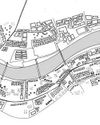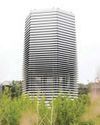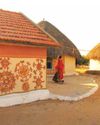試す 金 - 無料
Modern Spaces, Traditional Sensibilities
Indian Architect & Builder
|July 2018
The headquarters of Bajaj Finserv in Viman Nagar, Pune designed by NCUBE Planning & Design Pvt. Ltd. creates an ideal mix of spaces – for focused individual work, for collaborative efforts, and for partnering with clients – in relaxed yet formal environment; perfect for an industry that is modern in its outlook, but traditional in its approach.
The financial services industry is often said to be the most reluctant to change. Be it technology adoption, or office space design, the industry remains largely behind the curve and very traditional and cautious in its approach. And one can’t really blame them. There is a lot at stake if technology, or design, fails to put their employees, or clients, at ease.
このストーリーは、Indian Architect & Builder の July 2018 版からのものです。
Magzter GOLD を購読すると、厳選された何千ものプレミアム記事や、10,000 以上の雑誌や新聞にアクセスできます。
すでに購読者ですか? サインイン
Indian Architect & Builder からのその他のストーリー

Indian Architect & Builder
Interlacing Perspectives
‘Meraki-2019’ A visionary Seminar series presented by Dr.Baliram Hiray College of Architecture, Bandra(East), Mumbai.
3 mins
November 2019

Indian Architect & Builder
Facilitating A Community Through Architectural Practice
The humble, self-designed, self-built and organically planned home built by the majority of the world population rarely gets appreciated and critiqued as a viable lesson in architectural design.
5 mins
November 2019

Indian Architect & Builder
The Art Of Solving Problems Creatively
The practice of architecture is perhaps incomplete without the complement of a variety of other arts.
3 mins
November 2019

Indian Architect & Builder
Upcycling towards a playful tomorrow
Play is like the middle child, often forgotten, and always taking a back seat. For young kids, play can simply be running around, armwrestling with friends, building sandcastles on the beach, or singing popular music tracks in the shower.
3 mins
November 2019

Indian Architect & Builder
Balancing The Poetics And Pragmatism Of Everyday Design
Humanity is faced with an oxymoronic crisis. The crisis involves the earth, the environment, impending looms of climate change, deforestation, loss of species, dwindling resources etc.
3 mins
November 2019

Indian Architect & Builder
Just Give Me Some Space: Discussions And Beyond
Just Give Me Some Space (JGMSS) is Suha Riyaz Khopatkar’s debut book that paints a portrait of the dynamic life of an architecture student.
17 mins
November 2019

Indian Architect & Builder
The Next In Vernacular Architecture
Architecture has become a capitalist.
5 mins
IAB October 2019

Indian Architect & Builder
Rethinking The Future: Architecture And Its Education
“I want to be like animals, the bird makes a nest in one or two days, the rat digs a hole in a night, but intelligent humans like us spend 30 years to have a house, that’s wrong.” - Jon Jandai
10 mins
IAB October 2019

Indian Architect & Builder
Uniting The Human-Scale With The City-Scale
London-based architect Usman Haque is famed for his interactive architectural systems, and for his exploration of newer, more effective ways of creating human engagement and interaction through his designs. Indian Architect & Builder caught up with him, to quiz him on a variety of topics such as his journey as an architect, his inspirations and philosophies, architects using the digital revolution to their advantage, and more!
6 mins
IAB October 2019

Indian Architect & Builder
Framing spaces
Almost every architect also doubles as a photographer or at least an enthusiast.
5 mins
IAB October 2019
Translate
Change font size

